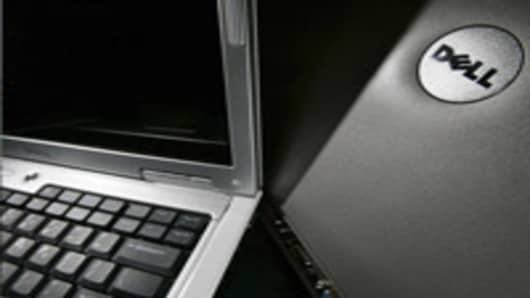Dellearnings almost doubled and blew past Wall Street forecasts as corporations continued spending on technology hardware, pushing the shares higher in extended trading.
The computer maker said it earned 53 cents a share in fourth quarter excluding one-time items, up from 28 cents a share a year ago.
On the sales side, Dell reported revenue of $15.7 billion, compared with 14.9 billion last year.
Equity analysts who follow Dell expected the company to report a profit of 37 cents a share on sales of $15.7 billion, according to a consensus estimate compiled by Thomson Reuters.
Non-GAAP gross margin came in at 21.5 percent, well ahead of analysts' estimate of 18.6 percent.
Looking forward, Dell said it expects revenue growth in the current fiscal year to grow between 5 percent and 9 percent. Street expectations, on average, stood at 5 percent.
The company sees non-GAAP operating income growth in the range of 6 to 12 percent.
Dell shares jumped more than 6 percent in extended trading. Get after-hour quotes for Dell here. The stock was halted for about 20 minutes beginning just prior to the quarterly results being announced.
Dell stock finished the regular Nasdaq session more than 1 percent lower at $13.91.
Dell reported a net profit, which includes special items, of $927 million, or 48 cents a share, up from $334 million, or 17 cents a share, in the year-ago period.
Dell, which is trying to shed a reputation for specializing in low-margin computers, still pulls in most of its revenue from selling personal computers. It has benefited from a surge in spending as businesses of all sizes spend again on equipment after two years of recession.
The quarterly results offered affirmation of Dell's continuing efforts to turn itself around and boost profitability.
Dell is waging an uphill battle to diversify its revenue base: it wants to become a larger player in the data center equipment market, a provider of IT services, and gain a toehold in the fast-growing mobile space with tablets and smartphones.
But it faces stiff competition from the likes of International Business Machines


